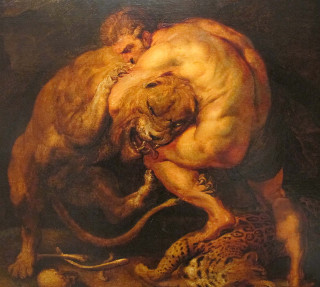Got Choices?

The Struggle to Survive
So mankind is alive. And he is hungry–in a variety of ways. He may look in various places for the energy he needs to survive until death relieves him of the struggle. He may look to the sun or to sources of energy stored in the earth. He may look to lower life forms such as plants and animals which have already done a fair amount of the work for him. Or he may look to other humans to do the work he needs in order to survive. As he does so, he may take what he needs by force or he may limit himself to the relationships he can arrange by a process of mutual and voluntary cooperation. Any guidance he expects to find about which course is socially, morally or ethically acceptable can ultimately come only from his Faith.
What do you want and need to maintain yourself and your family? Is there a right or a wrong way to get it? Is there a need for a morality or a code of acceptable conduct defining how we should interact with other human beings? If so, who will define it for you?
Unfortunately, the theme of predation in the early account of Cain and Abel will be repeated quite regularly throughout the rest of mankind’s history in acts of murder, war, rape and other mayhem. Certainly there have been pockets of civil society from time to time where people have been able to live lives of relative protection from the threat of human predators and parasites. But more often than not, the rule has been that those who are stronger have lived at the expense of those who are weaker. And force has been the deciding factor in establishing this social hierarchy.
Even when people have been fortunate enough to live under a king or government strong enough to protect them from outside predation by warring tribes or nations, typically those same people have had to sacrifice much of their own productivity just to sustain that king or government. In other words, people have had to accept the reality that parasites will rule over them domestically in exchange for the protection they hope to receive from potential foreign predators. In rare cases, perhaps this exchange has been completely informed and voluntary. But history would suggest, in most cases, it has quickly devolved into a state where powerful monarchs and dictators have grown accustomed to living off the labor of their subjects without giving much of anything in return.
It is a sad fact that most people throughout recorded history have lived under one kind of totalitarian rule or another. Societies recognizing the free will of the individual have been an extremely rare exception. Indeed this is why the American revolution and its resulting Constitution have been seen by so many as such an amazing and precious treasure. One could rightly argue, it set the stage for the relatively large degree of freedom enjoyed in countries throughout the world today. Admittedly, things could be better. But they have certainly been much worse.
When imagining the beginnings of social order, we sometimes theorize that mankind initially existed in a state of anarchy, or no government at all. In this situation, anyone can prey upon anyone else. In order to see how this operates, we only need to look at the animal kingdom where individuals fight among themselves for dominance and control over scarce resources. We see males fighting each other for the opportunity to mate with a finite number of available females. The strong will win out and their genes will be passed on to future generations. This is the fundamental principal behind the theory of evolution, and we can recognize it at work in nature all around us.
But even across disparate cultures, humans have repeatedly evolved past anarchy, organizing themselves into various types of social structures. Perhaps the most basic and common structure is the family or its extended version, the tribe. Where groups of individuals could identify as members of a tribe, they were able to cooperate in their common defense against other tribes and have a greater chance of survival.
This coordinated use of force or violence could be used defensively or offensively. More than likely, even a tribe that was inclined to use organized force only defensively would eventually discover that if they were victorious, they would benefit from a windfall of possessions obtained from the tribe they had just conquered. Understandably, even military capability which is developed purely for defensive use is also available for dubious purposes should it fall under the control of an unscrupulous leader–particularly when he might come under increased pressure to improve the standard of living for his people beyond what they are able to produce by the sweat of their own faces.
Another benefit of living in families and tribes involves the way we can take better advantage of the wide diversity of abilities, and sometimes the disabilities, of its various members. For example, some people might be big and strong–better at combat and so able to protect weaker members of the tribe. Some might lack physical capabilities but have strong intellectual talents. Some may be good at food production or at teaching and raising the new replacement generation.
If a social unit can cooperate in such a way that each person’s unique talents and abilities can provide benefit to the rest of the group, the well-being of all members can be improved. If such mutual cooperation is to be achieved, can it only be done by forcing everyone to participate? Or are there ways to organize socially which still allow each member the freedom to contribute their part on a completely voluntary basis so there are no parasites and no victims?
As a tribe becomes larger and more powerful, we might think of it more as a kingdom or a monarchy. Such kingdoms have expanded and consolidated into yet greater and more powerful monarchies. From time to time, monarchs have become so oppressive their own people have risen up in revolution to overthrow them. In some cases, the social order has then evolved toward other forms such as communism, fascism or democracy where the ruling elite may not be defined by blood line but by some other set of factors.
Regardless of the type of government, or lack thereof, which has existed at any given point in mankind’s history, the basic laws of economics have continued to run their course just as persistently as the law of gravity.
- People have wants and needs which come in a variety of types and degrees.
- People vary greatly in their ability to produce and in their suitability for different kinds of work.
- It takes work to produce the things we want and need.
- Most people don’t enjoy working more than they would choose to.
- One way to work less is to specialize in the things we are best at and then voluntarily trade with each other for the other things we need.
- Another way to work less is to make other people do our work for us.
- People would rather direct their own work than unwillingly have their labor exploited.
- If you are intent on unfairly exploiting the labor of others, you will have to either trick them, or force them.
This final conclusion describes a phenomenon unfortunately more common throughout history than any other system of social organization: Involuntary Servitude.
